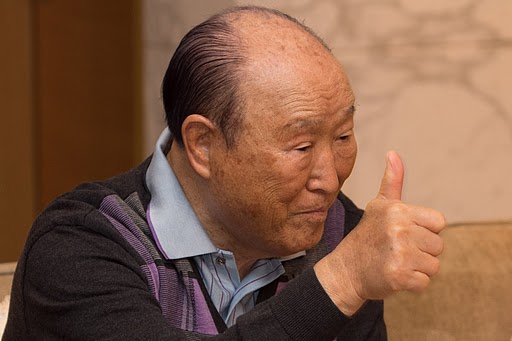![]()
The Words of the Lausberg Family
|
|
The Words of the Lausberg Family |

Special thanks to Elder Andrew Lausberg of Australia Let me start from a linguistic/semantic breakdown, and then go on to discuss the nuances, context, meaning in Father's history, etc.
Jeong = clean, spirit, essence. It is a hancha (Korean Kanji) character, composed of the radical for rice next to the character for blue, as in: Jeong shin [spirit, spirit body] (Japanese: seishin) Jeong mil + hada [detailed, meticulous] (Japanese: seimitsu-deki)
Seong = sincere, devoted. It is a hancha composed of the radical for word next to the character for become, achieve (Japanese pronunciations of Seong are makoto, sei as in: Jeong Seong [loyalty] (see Family Pledge) Seong shil + hada [sincere, honest, etc.]
Together, Jeong Seong (Japanese: seisei) means according to the dictionary, "to be true and honest, to embody those qualities of goodness, trueness, be unwavering in honesty and the righteous path of life, etc."
More importantly, this work -- in the context adopted and used by Father, (and in the Korean Unification movement accordingly) can be roughly interpreted as "efforts, prayer based upon utmost sincerity" -- "sincere heart and efforts".
As in "God's will can only be accomplished through your sincere heart and efforts"
Jeong Seong means investment, and it is the encapsulation of Father's tradition and approach to the problem of restoration as well as recreation. When Father is talking about investing, he is talking about investing Jeong Seong. Father practices a life of investing or dedicating his Jeong Seong. Hence, Jeong Seong can mean whatever you invest for God's will and ideal: prayer, sacrifice, fasting, working hard to meet people and convey to them God's message, sweating, working hard... all this is Jeong Seong. (Narrowly, Jeong Seong means conditions like heartfelt sincere prayer, etc. Broadly, it means everything and all efforts we sincerely make for God's Kingdom.)
Where an understanding of Jeong Seong is, in my opinion, so powerful is that it transcends the Fall. The concept of indemnity applies only to restoration; Indemnity only restores what was lost, to get back to the original point. Accordingly, indemnity has the nuance and connotation of suffering and pain. Jeong Seong, however, is "restoration-free" or "restoration transcendent". That is, it is a concept and practice equally valid in the path of restoration (where it results in indemnity) but also in the path of creation (where it results in... creation).
To reword this, somehow the idea of indemnity it inherently tied to Satan, as it became necessary because of Satan and the fall. But Jeong Seong is an original concept and practice; it was and is God's way of life: God invests himself for his children and his creation, over and over. He puts in his tears, sweat, blood, prayers, efforts, work, everything. And God invests because he knows that it will come back. He did so in the Creation, and his is doing so in the recreation.
The universal law that what you invest comes back -- that it is rewarded -- lies behind the principle of Jeong Seong. So Father doesn't worry, but just determines he will invest more Jeong Seong.*
Please, when you get an opportunity, I would really like to ask everyone on our list to grab a few moments, and ask your Korean brother or sister, (or especially your centrally positioned person) about "Jeong Seong", and just listen to what they have to say. (Many Korean bros and sisters haven't understood how important it is for non-Koreans to have access to this central tradition/concept of Father's -- indeed, they may only understand it more in a "Korean" sense rather than in "Father's" sense. But there will be something they can share, absolutely. gambarimashou!
* That this concept and practice has not been clearly conveyed to the non-Korean non-Japanese areas of the Unification family is a most grievous situation, and is something that can and must be fixed. From my view, it is one of the key issues in
a) obtaining worldwide unity in the Unification family and
b) succeeding in our providential work.
Also, generally speaking, Japanese Blessed Families understand Jeong Seong, but not fully, and have not understood it in the same way. There is an emphasis on external conditions in Japanese culture that can 'blind' one to the fact that heart and internal motive are the key factor in Jeong Seong. The effort part they have got down pat, though!!! Japanese blessed families are the champions of effort!!!
Andrew Lausberg, B.A., Grad. Dip.
Korean, Japanese and English
Translation
www.oceanasia.com